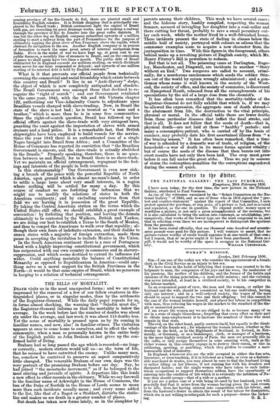THE BILLS OF MORTALITY.
DEATH visits us in the most unexpected forms ; and we are more impressed by the removal of a few of our fellow creatures in dis- tingnished places, or in sinar modes, than by the arithmetic of the Registrar-General. the daily paper _repeats for us, in forms almost shocking, the warning that " .1.a.thn. must die," the Registrar-General informs us that the mortality, is below the average. In the week before last the number of deaths was about six under the average, and last week it was about 115 deaths less. Yet the sense of mortality, is pressed upon us by its coming in familiar names, and now, alas ! in familiar crimes. The visitation appears at once to come home to ourselves, and to affect the whole community, when a man so personally known to the entire body of the English public as John Brahain at last gives up the con- firmed habit of living. Braham had so long passed the age which is recorded—no long- er correctly, modern statists would tell us—as the term of life, that he seemed to have outwitted the enemy. Unlike many men, too, somehow he contrived to • reserve an aspect comparatively little changed. The venerable Braham of our own days was the yery portrait of the promising Braham before our day. Nay, he had joined " the moustache movement," as if he belonged to the most stirring and juvenile of spirits. A departure like this lends a new effect to other records in the obituary. While we say farewell to the familiar name of Arkwright in the House of Commons, the loss of the Duke of Norfolk in the House of Lords seems to mean more than such incidents usually mean ; and every name added to the list, like that of a Begot or a Stoddart, disturbs the statis- tics and makes us see death in a greater number of places.
But death has taken new forma lately, as in the slaughter by
parents among their children. This week we have several cases ; and the hideous story, hastily compiled, respecting the woman Bonnier, accused of inveigling her daughter into a coal-cellar and there cutting her throat, probably to save a small pecuniary out- lay each week, while the mother lived in a well-fternished house. These incidentu present the state of feeling in classes below the middle half of society, portrayed with colours so odious that the commoner examples seem to acquire a new character from the juxtaposition in time. With this figure in the foreground, others in
d make up a revolting picture of English society, which Mr. Henry Fitzroy's Bill is powerless to redeem. But that is not all. The poisoning cases at Darlington, Rugs- ley, Manchester, and Dingwall, are incidents in another " Story without an End." Two surgeons are called to account, crimi- nally, for a murderous carelessness which sends the soldier Stin- son out of the world by opium wrongly administered ; and a gen- tleman whose name is well known in the society of the West- end, the society of office, and the society of commerce, is discovered on Hampstead Heath, released from all the entanglements of his speculations by the aid of a large dose from the chemist's.
It has often been remarked that the mortality-tables of the .Registrar-General do not fully exhibit that which is, if we may be allowed the expression, the aggregate sum of death abroad— the abatement from life, the destruction to the vital principle, physical or moral. In the official table there are fewer deaths from those particular diseases that inflict the final stroke, and that is all. It does not follow that the seeds of death—that is, physical death—are not laid at those " healthy" periods ; and many a consumptive:patient, who is carried off by the heats of summer, may probably date his first ascertained illness from " a fine bracing season." It has often been remarked, that a time of war is attended by a domestic war of trade, of religion, of the household—a war of death in its many forms against vitality ; but of course the seeds of the disease that then bursts out into overt results have not only then been laid. The crop must grow before it can fall under the great sithe. Thus we pay in seasons of storm the redemption-penalties for the corruptions engendered during the season of quiet.


























 Previous page
Previous page